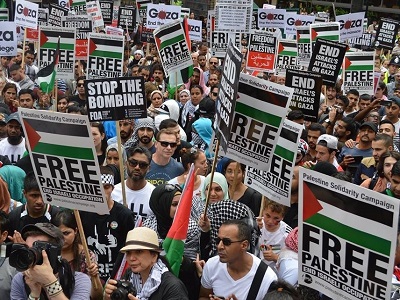
In a press release issued on December 1, the UK-based Palestine Solidarity Campaign (PSC) added its voice to others who have accused the New Statesman publication of censoring Palestinians.
A day earlier, PSC had launched a public action calling for the New Statesman to republish an article by Salah Ajarma, co-founder and Director of the Lajee Cultural Centre in Aida Refugee Camp in Bethlehem.
“The New Statesman originally published the piece as part of a two year partnership with the PSC, but deleted it without warning or explanation, following a campaign by the pro-Israel blogs UK Media Watch and Honest Reporting. Within 24 hours of PSC launching the public action over 3,000 people have emailed Jason Cowley, the editor of the New Statesman, calling on him to republish the article, apologize to Salah, and affirm the New Statesman’s commitment to freedom of expression,” the statement read.
Its readership and potential readers: A Boycott of The New Statesman in response to its censorship … https://t.co/I4JtaSx8h8 via @UKChange
— Waltham Forest PSC (@wfpsclondon) December 1, 2016
PSC director, Ben Jamal said, “all of those, including journalists, who have a concern about justice and fair reporting, will be deeply alarmed at the New Statesman caving in to external pressure and agreeing to censor a Palestinian voice.”
The writer of the article, Salah Ajarma also expressed her dismay. “Living under occupation we are used to our voices being silenced by Israel – but we expect better from the UK which is supposed to be a democracy,” she said.
According to the statement, Salah’s article “describes the experiences of young Palestinian refugees in Aida camp and how Israel’s illegal settlements impact on his life and the lives of people in his community. Salah’s article was seen and approved by New Statesman editorial team before it was published online and read and shared by many thousands.”
New Statesman Old #Censorship.Please take action now-tell @NewStatesman 2 stop censoring #Palestinian voices http://https://t.co/tpIedO5uCV pic.twitter.com/hgeZZJvACU
— ManchesterPSC (@ManchesterPSC) November 30, 2016
It goes on to read,
“A few days later – without notice or explanation – the article was suddenly removed. The New Statesman has since refused to give an explanation to Salah and PSC as to why this action was taken. In an email to the PSC, the New Statesman initially stated that the article had been removed as a result of ‘reader complaints’, they would not give detail on the nature of the complaints or from whom they had been received.
“Despite numerous requests, New Statesman Editor Jason Cowley, refused to have a conversation about the issue or to take any calls from PSC. PSC received a final email from the New Statesman, seven days after the article had been removed, indicating that the article had been removed because it conflicted with the magazines editorial independence and stating that they would not be offering any further comment or having any further conversations with PSC.
“PSC has been working with the New Statesman for two years to co-host events at Party Conferences and commission and publish online pieces. Three articles were published as part of this arrangement in 2015. This year the focus has been on Israel’s illegal settlement program, Salah’s was the second in a series of five agreed articles. The articles published complimented the events hosted at the Labor Party and SNP conferences earlier this year.
This is the latest of a saga in which various organizations and intellectuals have complained that supposedly leftist and progressive media in the UK are caving in to Israeli pressure.
PSC, who says the New Statesman has “politically censored a human rights campaigner…living under very harsh… https://t.co/i6Tht3THLl
— antonio maniscalco (@antoniomanisca4) December 1, 2016
n a recent article published in Middle East Monitor, British writer, Ben White argued that the British Guardian newspaper is excluding Palestinian voices from its commentary pages. White based his assertion on statistical research, in which he also found that voices of Palestinians on the ground are almost completely absent from the paper.
“Out of 138 op-eds on the topic published by the newspaper in its ‘Comment is free’ section from October 2013 to November 2015 (including both print and online-only articles, as well as content from The Observer), just 20 were written by Palestinians – 15 per cent of the total,” he said.
PSC’s Ben Jamal called on the New Statesman to republish Salah’s article. “If it is to restore its reputation as a journal of merit the New Statesman needs to re-publish Salah’s article and offer him an apology for the astonishing disrespect it has shown to him and to his work,” he said.
(PSC, PC, Social Media)




